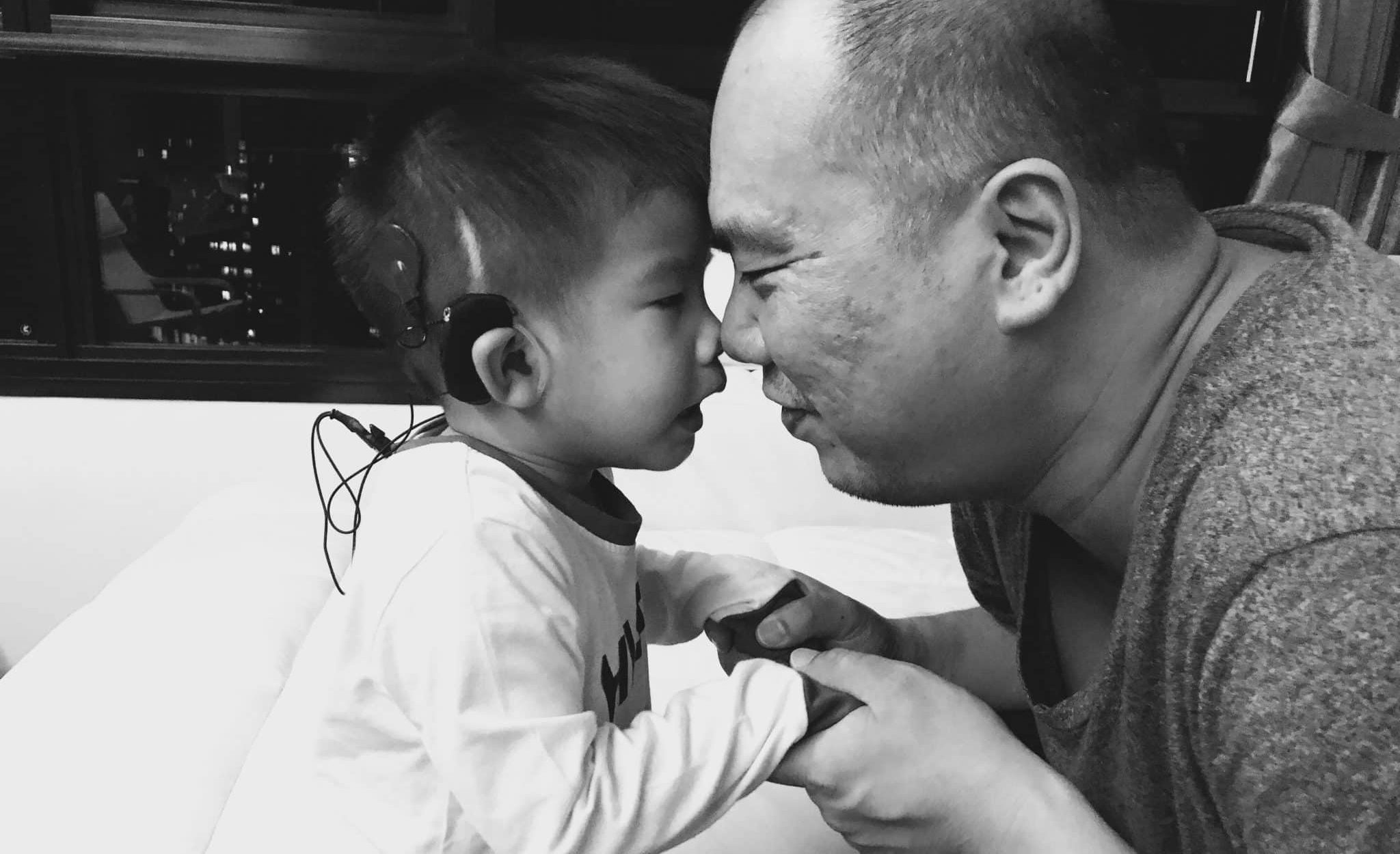
When Kaleb was six months old, we noticed that he slept through lion dance performances during Chinese New Year and other loud celebrations.
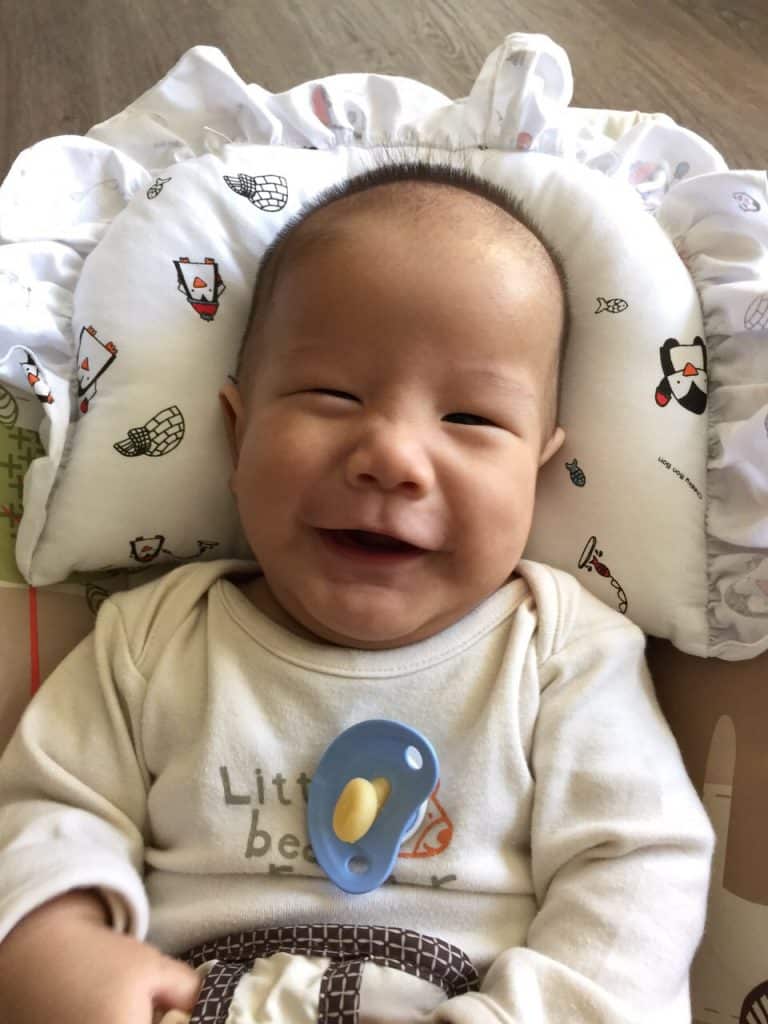
Kaleb as a baby was always smiling and so easy to look after. He was so expressive and responsive to us that we did not suspect that he was born deaf.
Worried, we took him for hearing tests. It was the start of a tedious, complicated and stressful medical journey.
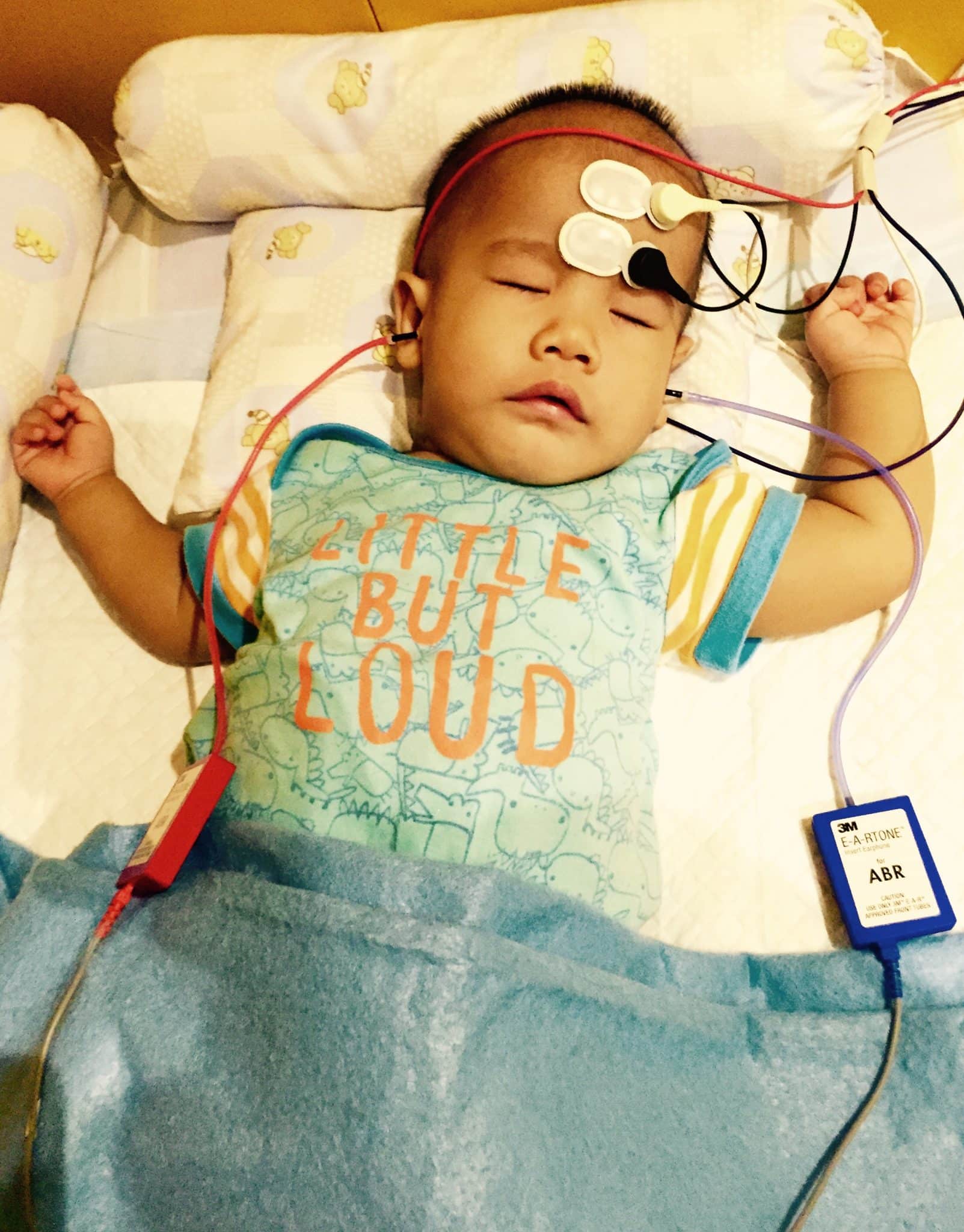
Kaleb was sedated for the Auditory Brainstem Response (ABR) test that recorded brain wave activity in response to sounds piped through ear phones.
He was nine months old when the doctor confirmed our worst fear: Kaleb couldn’t hear in both ears. His brain didn’t register sound waves below 100 decibels, which is equivalent to a jet taking off 300m away.
My wife Julia was devastated and burst into tears. I was too shocked to respond.
Then our doctor said that cochlear implants may give Kaleb a chance to hear.
This gave us hope.
But in order for the implants to work well, Kaleb’s hearing nerves needed to function normally.
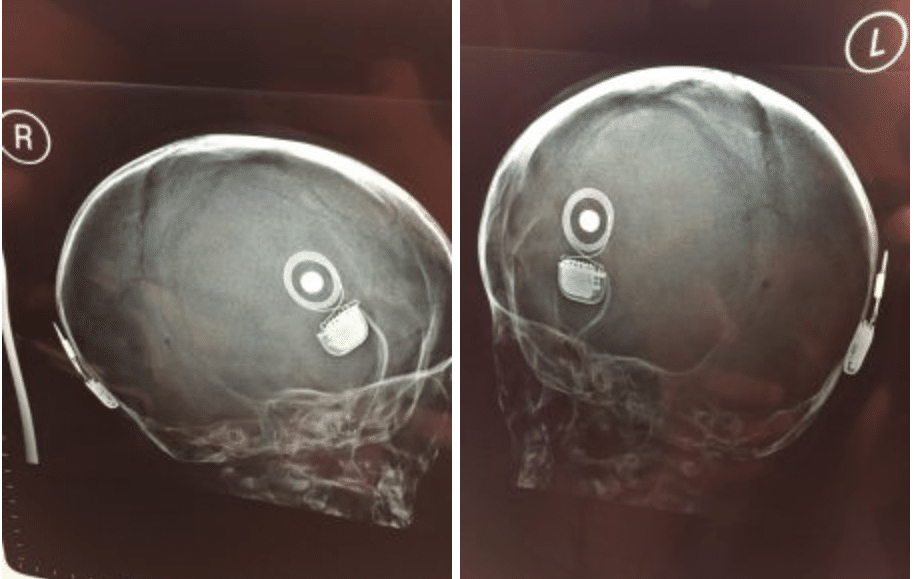
Scans showing the implants that Kaleb eventually got. Kaleb wears two external sound processors (see opening photo) that capture and send sound signals to receivers implanted under the skin behind the ear. The receivers send the signals to electrodes implanted into the snail-shaped inner ears (cochleae).
So Kaleb went through a battery of costly tests including MRI and CT scans.
We asked everyone we knew to pray for our baby.
When the doctor phoned me, she said: “Mr Eng, I’m very sorry. I found out that your boy Kaleb doesn’t have a hearing nerve in his left ear, and only has a tiny hearing nerve in his right ear.”
Based on medical evidence, Kaleb wouldn’t be able to perceive sounds with cochlear implants.
I remember crying and screaming, questioning God: “Why is this happening to my family?”
“Why don’t You take away my hearing and give it to my baby boy?”
“How am I going to break the bad news to my wife Julia who is pregnant with our second child? I don’t want her to spiral into depression.”
In my grief, I told God: “Why don’t You take away my hearing and give it to my baby boy?”
Then I got an impression of Him saying: “If you, an earthly father are willing to do this for your son, what more am I, your heavenly Father, willing to do for you and Kaleb?”
It came as a small, still voice within me.
In the depth of my pain, I experienced God’s deep love, peace and assurance – and understood the depth of our heavenly Father’s love. It was a surreal experience.
Still, there were many nights when Julia and I cried together. I doubted God and worried about Kaleb.
I didn’t want Julia to experience too much of my pain, so I often cried alone in my car until I couldn’t cry anymore. I listened to songs like You Are For Me by Kari Jobe for about 30 minutes until I returned to joy. They reminded me that God is for – and not against – Kaleb.
Julia and I – both go-getters who believe that everything can be dealt with and solved – knew that it was beyond our control to give Kaleb his hearing.
We felt so helpless. So we focused on what we could do. We could help Kaleb to grow up to be happy and healthy.
We felt so helpless.
So instead, we focused on what we could do.
We could definitely help Kaleb to grow up to be happy and healthy.
So we played games with him, and talked to him as if he could hear. We assured him through touch. And through visual cues like gestures and role playing, Kaleb learnt to lip read.
We gave God our best efforts, and let God have the final say in whether Kaleb would be able to hear.
Julia and I were constantly surrendering our pain to God, and asking Him for direction.
We tried to find out as much as we could about how we could help Kaleb.
We sought second opinions from other specialists. But were upset when one doctor told us too bluntly: “Don’t waste your time. Nothing will work for your son. Just send him immediately for sign language lessons. There is nothing else we can do.”
Then we met a boy who did not have a hearing nerve … who is now learning aurally in a mainstream school.
We met up with families of kids with cochlear implants. Among them was a mother and her nine-year-old son. Like Kaleb, this boy didn’t have a hearing nerve prior to an implant surgery. But this boy was now picking up sounds and learning aurally in a mainstream school. He is also able to speak, even if his speech was indistinct. This surprised us and gave us hope.
Our doctor said: “The brain is so incredible, no one can fully understand it.”
But she warned us that there were no guarantees that Kaleb would be able to hear with the implants. He would also need to go for weekly speech therapy. It may take as long as four years to see if he could hear well enough to learn aurally. If not, he may need to learn sign language after all.
The doctor said: “Mr Eng, you have to decide quickly whether to go ahead with the surgery. Because any delay may affect Kaleb’s learning and growth.”
You can imagine the pressure and uncertainty we were under.
But after praying with our church leaders and friends, we got the message: There is hope. God has the final say; don’t be limited by medical knowledge and evidence.
We felt God’s peace in our hearts when we decided to send Kaleb for the cochlear implant surgery. But it was a big leap of faith.
We needed $120,000 upfront to pay for the operation, medical fees and hearing implants.
Most of our savings had gone into our new home, Kaleb’s birth the previous year, specialist fees and tests for his hearing – and the birth of our second child who was born 14 months after Kaleb.
We also needed funds for the years of auditory rehabilitation therapy that Kaleb required after surgery.
The largest cheque – $10,000 – came with a note that said, “Don’t try to find out who we are.”
Then church friends suggested that we write our story so that they could use it to encourage others to contribute to Kaleb’s medical fees. We are from the sandwich class – not poor, but not rich. We didn’t feel good raising funds, but we had to let go of our pride and ego and allow others to help us. We deliberately didn’t share this appeal on social media.
On our pastor’s advice, we started a bank account for Kaleb’s medical needs. For accountability, our pastor and small group leaders could see how the funds were used.
We were confident that God was aware of our needs, and had faith that He would provide.
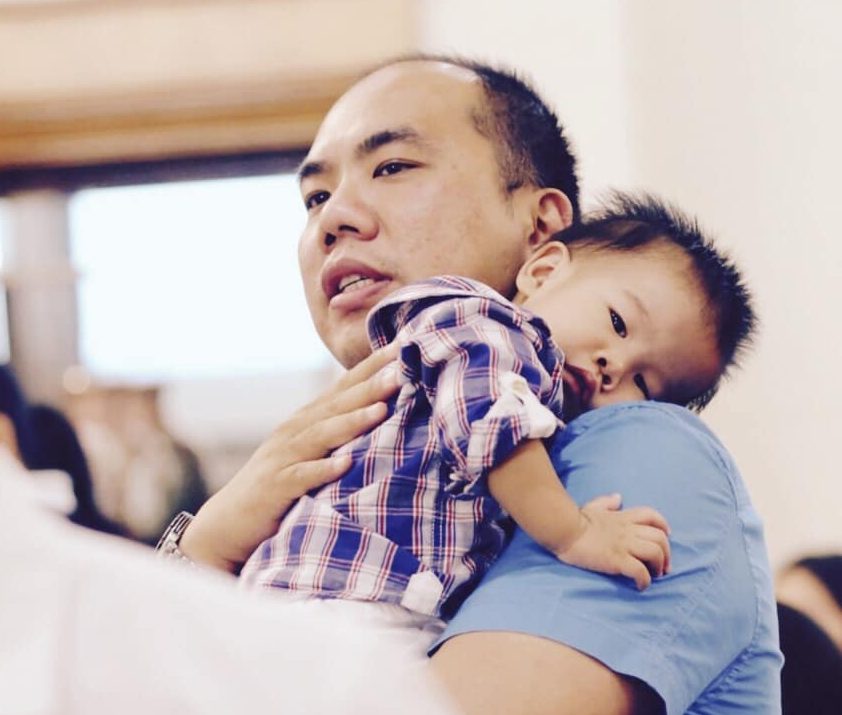
An endearing baby: Kaleb returns my affection in this photo taken a few days before the surgery.
We opened our mailbox to find cheques coming in. The largest cheque – $10,000 – came with a note that said, “Don’t try to find out who we are.”
Rohei, the learning and consulting company I work for, organised a half-day workshop on resilience that I facilitated with the help of my colleagues, to raise funds for Kaleb’s operation. Five days before the event, fewer than 30 people had signed up. But on the actual day, 108 people showed up, and we raised $34,000.
I think it is important, for fathers especially, not to bury our emotions and hope that they will go away.
In less than two months, we had almost $134,000 – more than enough to cover the surgery. We used the balance to cover Kaleb’s post-treatment costs.
I wrote a thank you note to people to tell them to stop sending money.
God had provided not just the funds, but a community who rallied around us. We didn’t need to go through it alone.
Talking to my male Christian friends helped me. I think it is important, for fathers especially, not to bury our emotions and hope that they will go away. We also need to release and surrender them to God.
When he was 18 months old, Kaleb had the implant surgery.
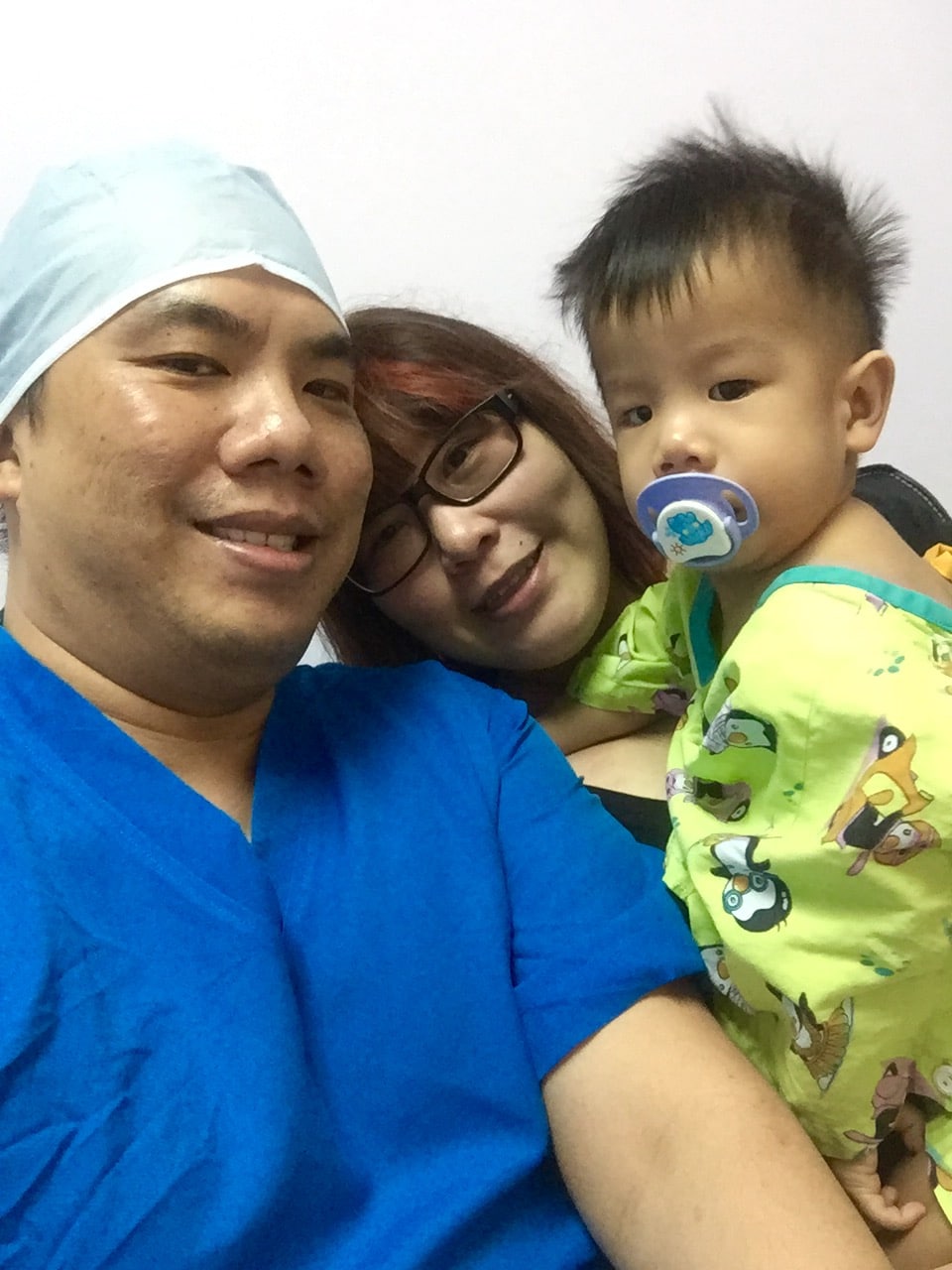
After Julia and I prayed for Kaleb, I took him into the operating theatre and watched the anaesthesiologist put him to sleep. I didn’t want Julia to do it in case she got too emotional; she was pregnant with our second child at that time.
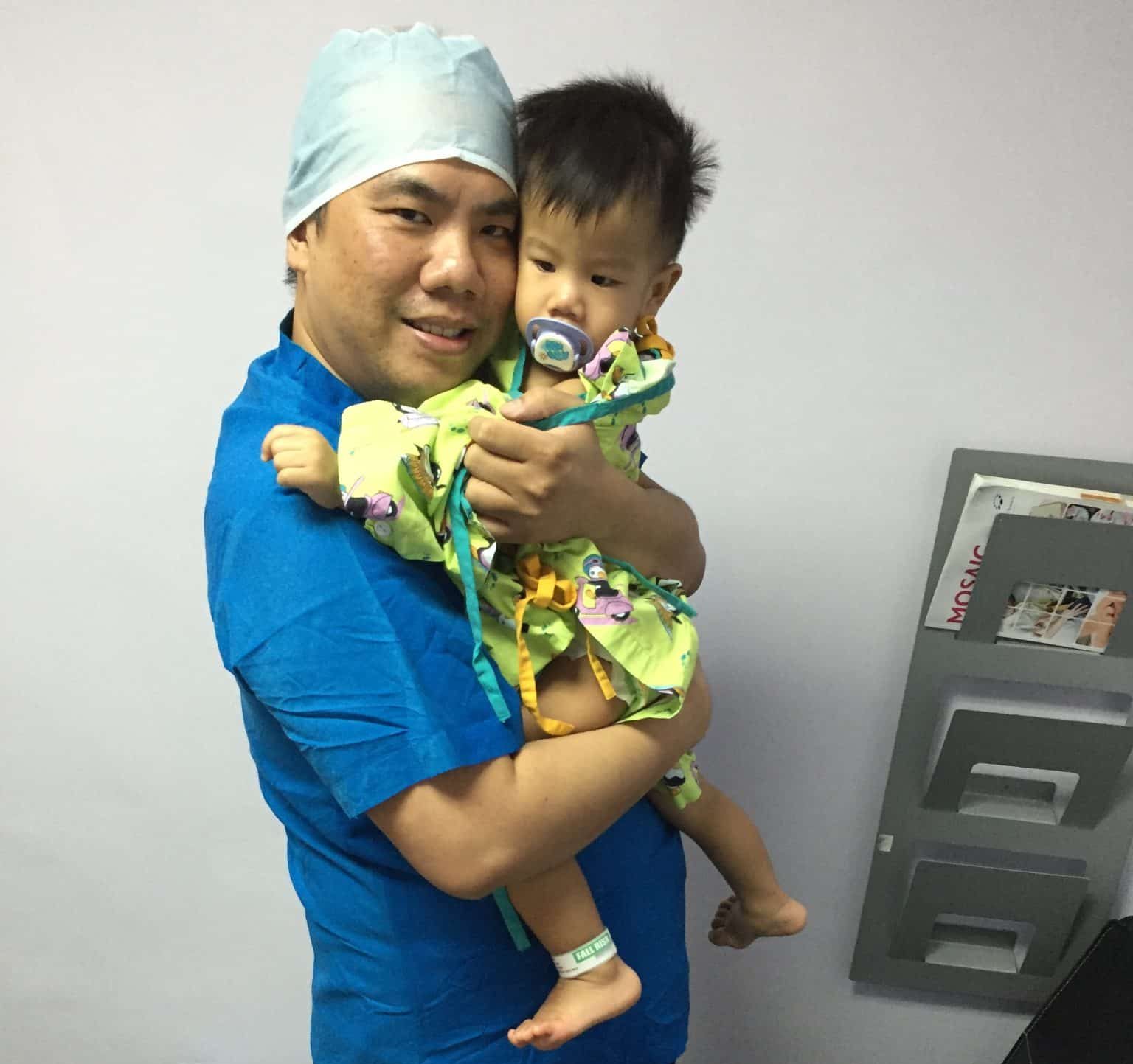
I was in tears when I left Kaleb in the operating theatre, but reminded myself that God had already given us the miracle money for the operation, and I shouldn’t be fearful.
The five hour surgery ended up taking eight hours. Kaleb’s ears leaked blood and water, and when he awoke, there was no joy in him.
I went down on my knees and asked God if I had made the right decision to do this to Kaleb.
Even if Kaleb could not hear, I’d rather have my joyful baby back.
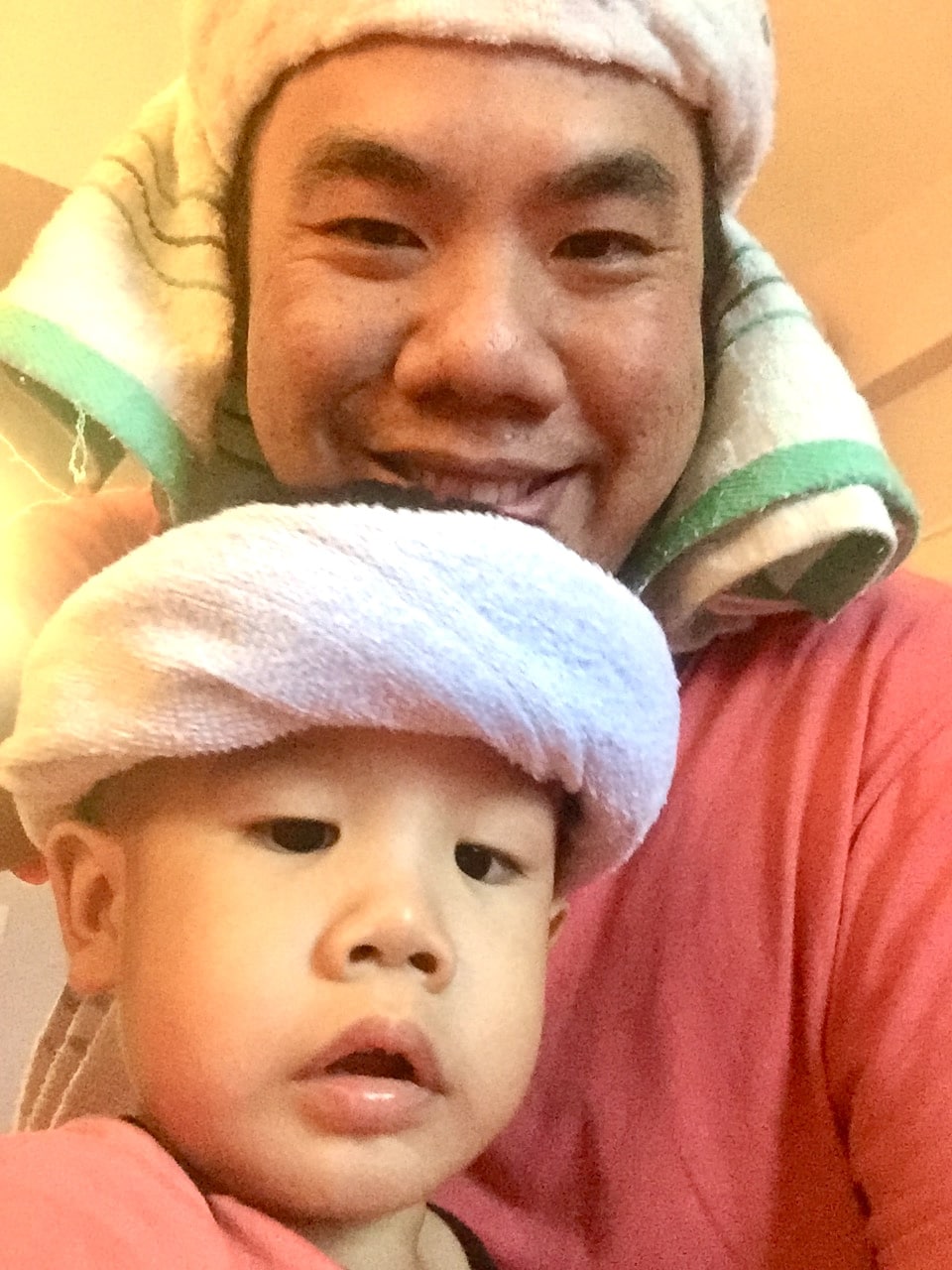
In the week before the surgery, I wrapped towels around our heads to show Kaleb what to expect after the surgery.
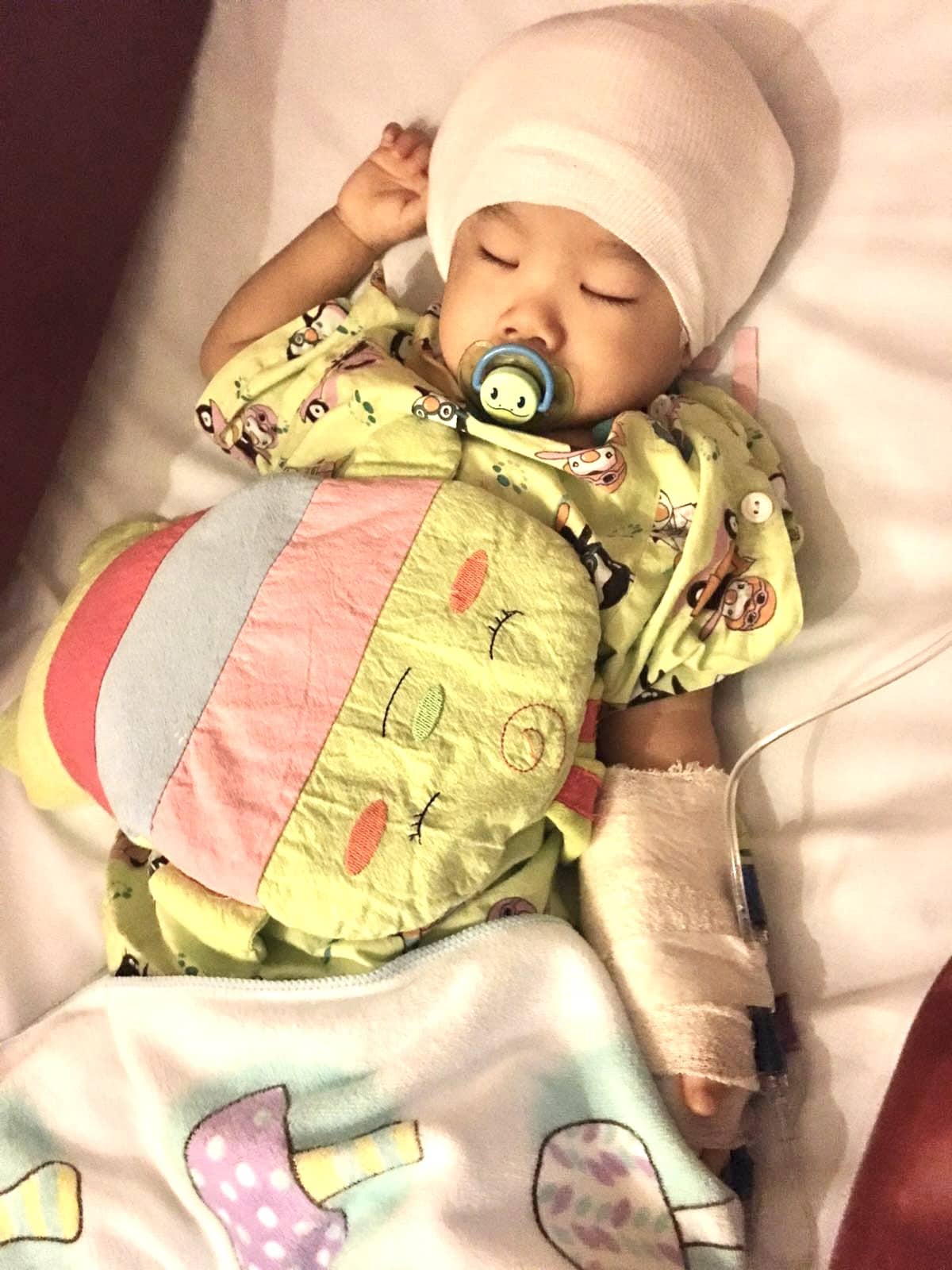
Kaleb’s head was bandaged after the surgery.
I felt God assure me that everything would be okay. The only hope that I had was to trust in the Lord.
The next morning, Kaleb returned to the operating theatre for another nine-hour operation.
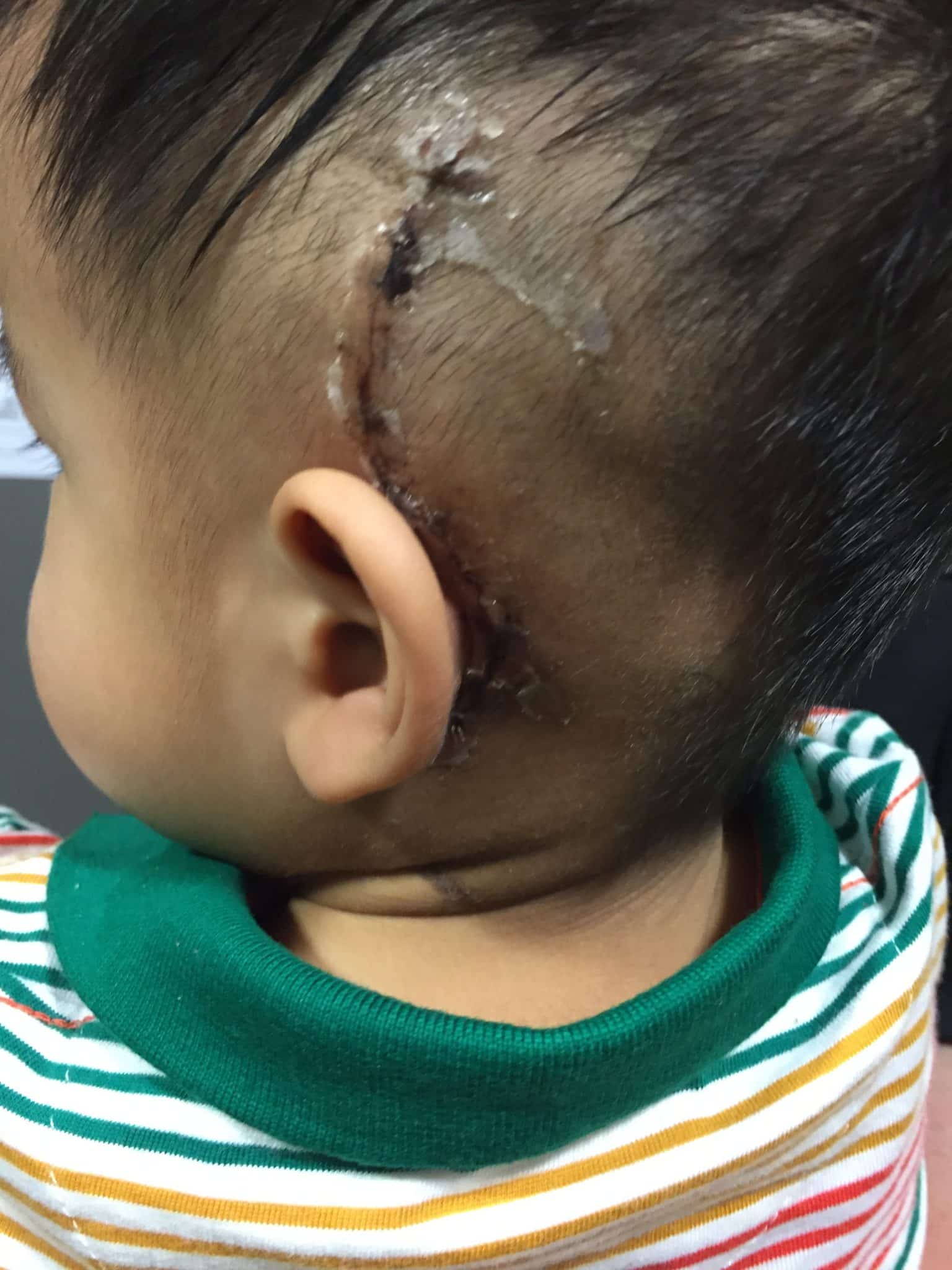
The incision from the surgery took about two months to heal.
When he woke up, I got my joyful baby back. His appetite returned, and he drank his favourite apple juice.
As we had been warned, Kaleb showed no reaction to sounds during his weekly speech therapy sessions for the first year.
Julia and I didn’t want Kaleb to see that we were discouraged, so we went to a corner if we needed to cry and pray. We continued to trust God and believe that Kaleb could perceive sound even though he showed no reaction to them.
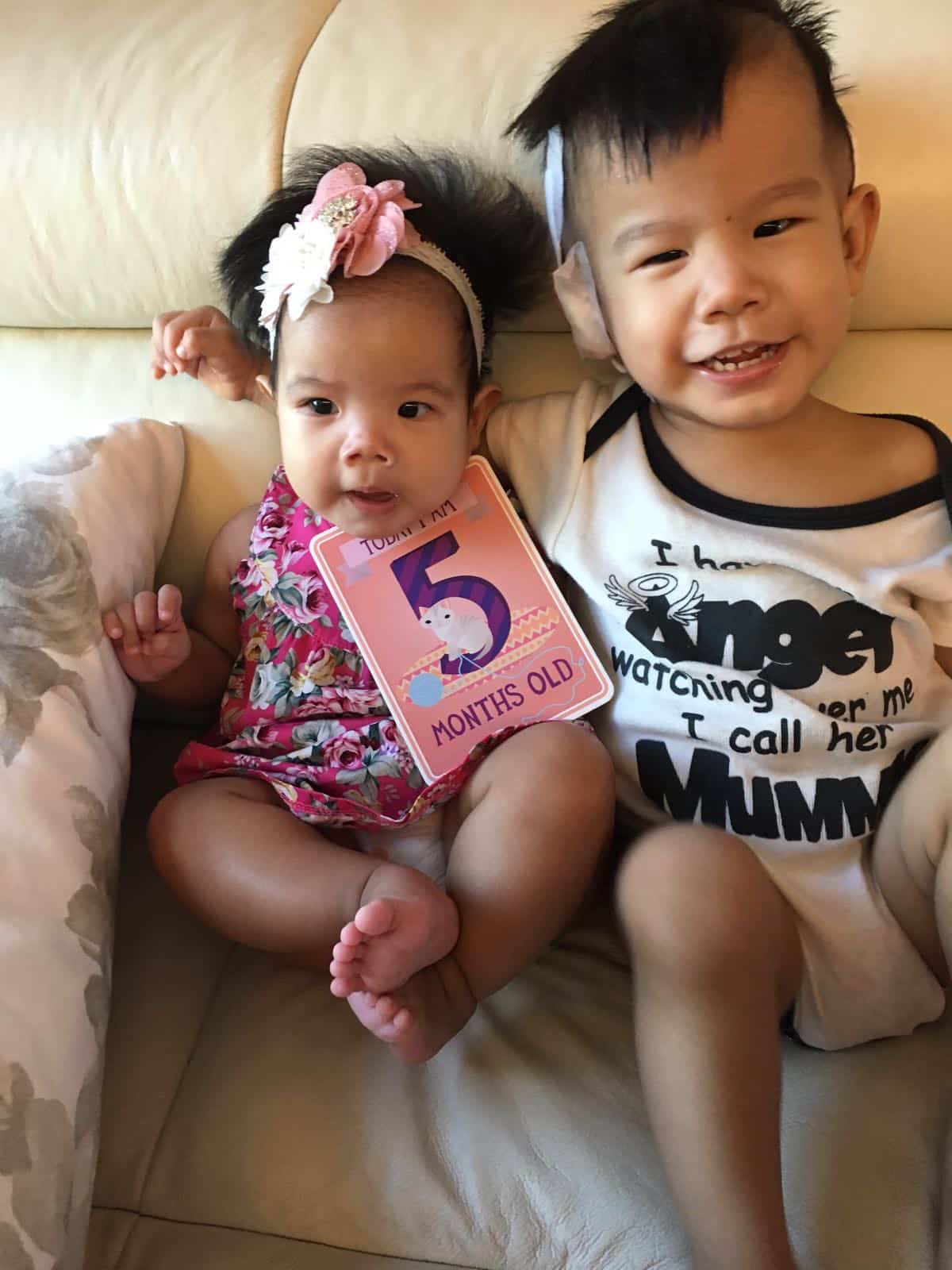
We wondered why we found out so late that Kaleb was deaf. Then we realised that if we had known earlier, we were unlikely to have a second child. So God blessed us. Kaelyn does not have any issues with her hearing.
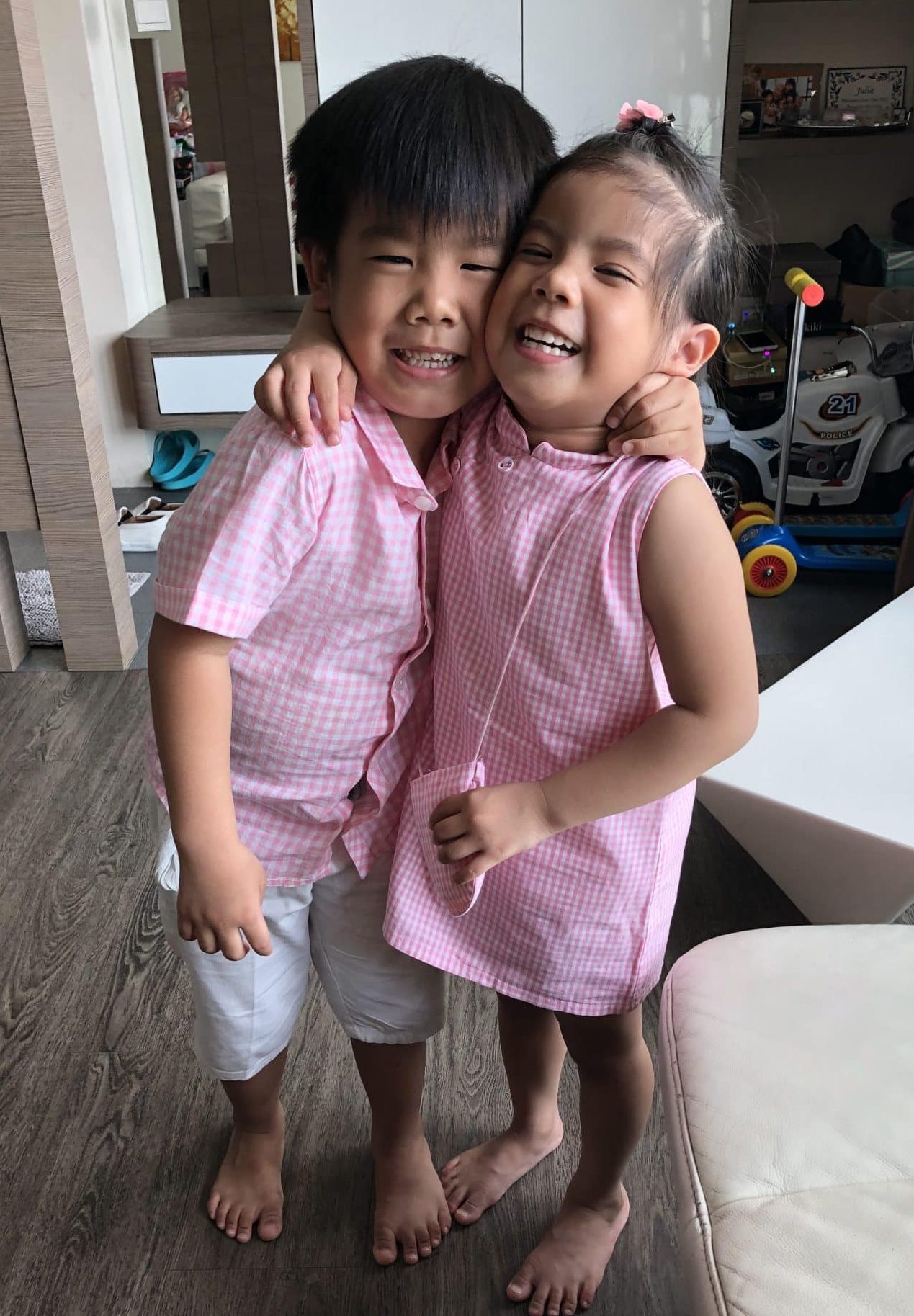
Kaleb and Kaelyn talk non-stop to each other. She encourages Kaleb to be communicative, and reminds him if he doesn’t pronounce his “t’s” properly. Kaleb will be 9, and Kaelyn will be 8 this year.
It wasn’t easy, hearing other kids calling their parents “Papa” and “Mama”. We wondered if Kaleb would ever call us “Papa” and “Mama”.
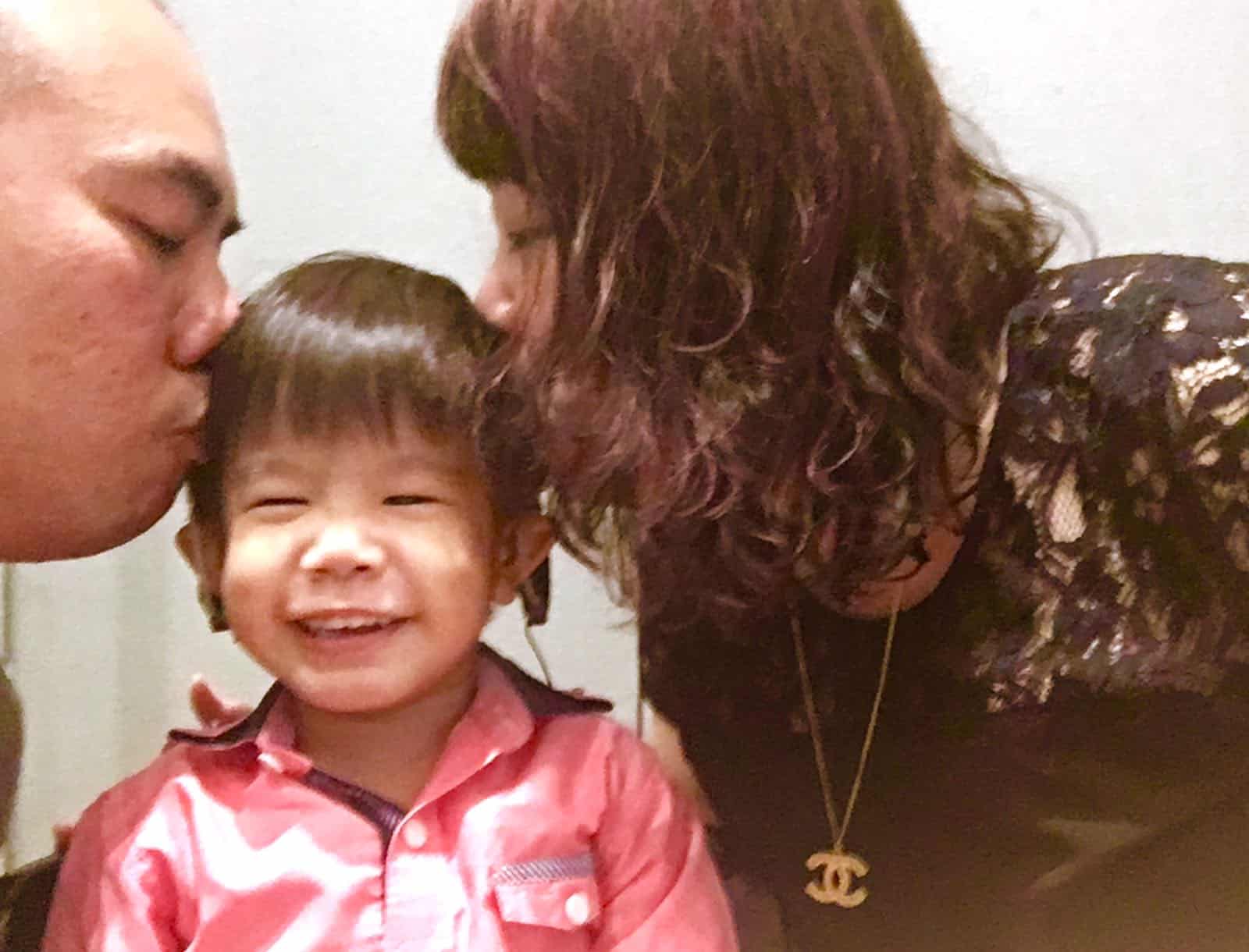
The weekly speech therapy sessions could be joyless and discouraging when there were no results. Even then, we wanted Kaleb to have a lot of fun, so approached them as an adventure for him. Eventually, when we called his name, Kaleb was able to turn around. He recognised our voices.
Then when he was almost three years old, we saw Kaleb react to a sound for the first time.
It was such a joyful moment! Julia and I were so happy.
Gradually, he made his first sound. Then he said his first word. We celebrated small moments like these.
When he called me “Pa”, I thought: “This is really God’s miracle.”
Then when he was four, he was able to form a sentence.
In the year that he turned five, there was a sudden acceleration and Kaleb’s speech improved and he started to repeat things after us.
Kaleb had defied all expectations. Our therapist and doctor were shocked that his speech was so clear.
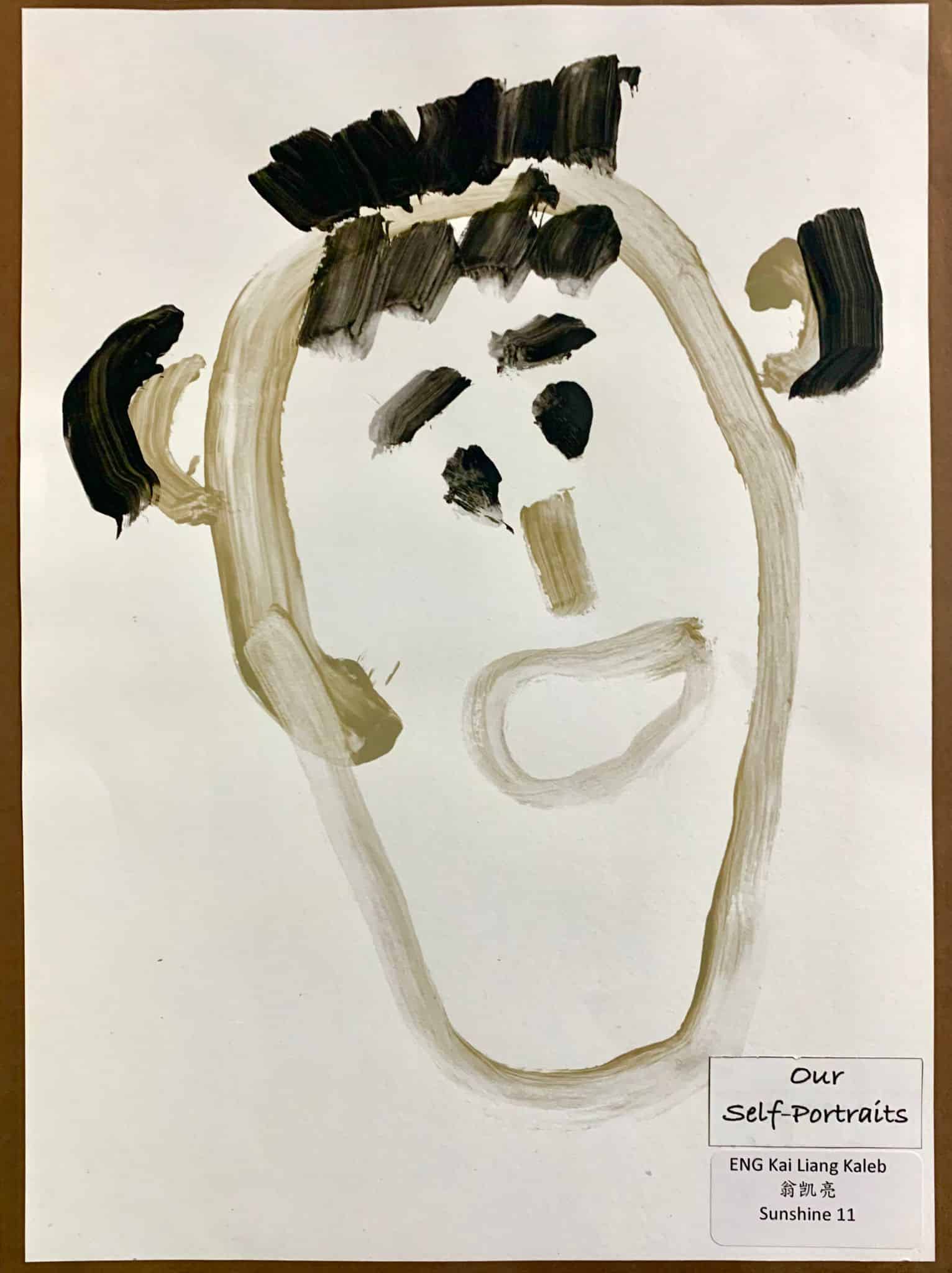
When Kaleb was four years old, he came home from preschool with a self-portrait. He told me excitedly: “I draw myself today and what is so special are the two black ear pieces on my ears.” I was moved to tears because he was so proud of his cochlear implants, and that he had embraced them as a part of himself.
It was very surreal when he said “I love you Papa” for the first time. (Below is a video from Kaleb’s 5th birthday.)
I told God: “You are a miracle worker.”
Kaleb is now in Primary 3, learning and playing in an inclusive environment at Canossa Catholic Primary School with students who have no hearing loss. The school partners with Canossian School which offers audiology support for kids with hearing issues.
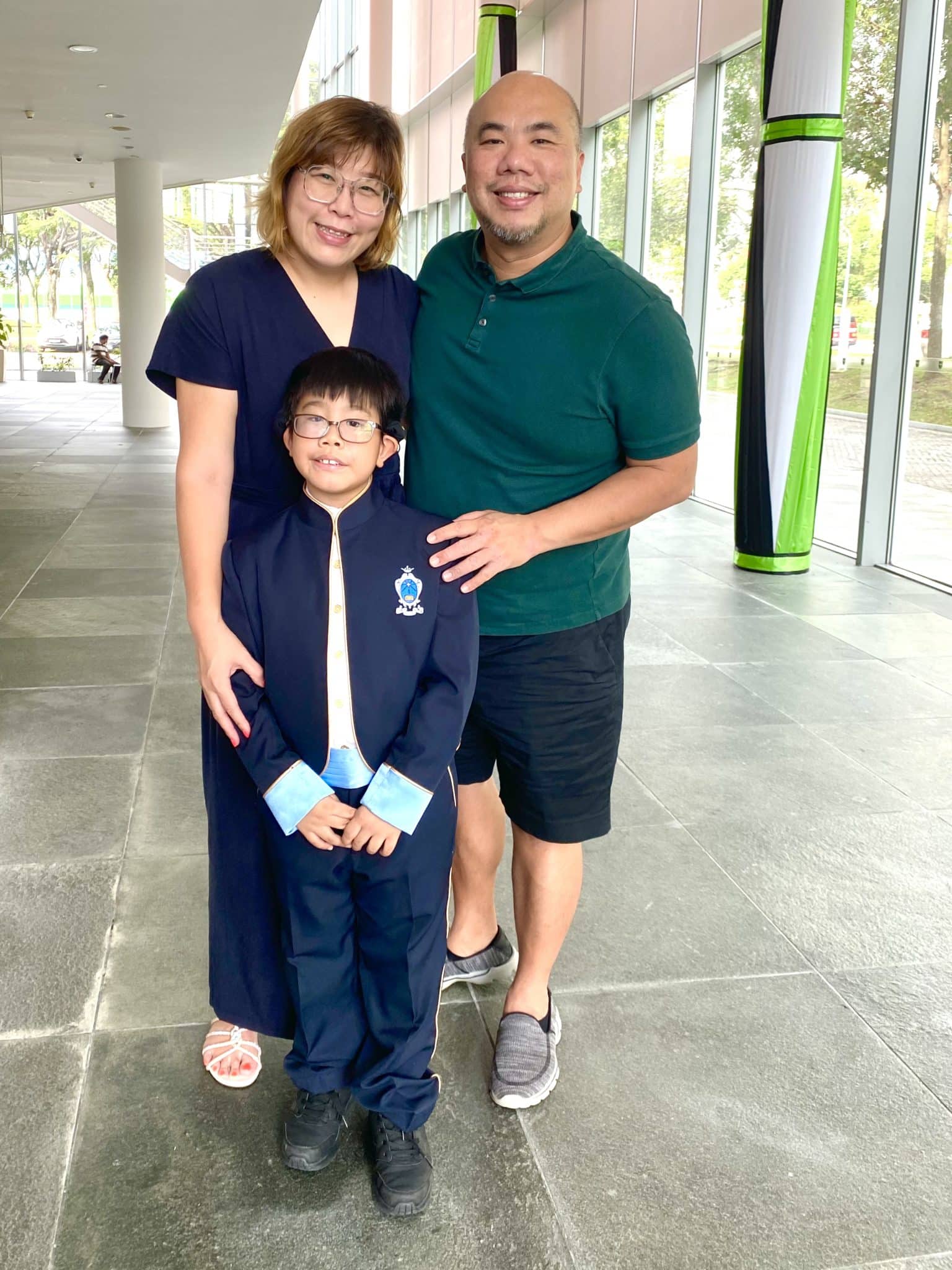
Kaleb, plays in the percussion band at Canossian School, and performed at last year’s Singapore Youth Festival.
Still there is a lot of uncertainty. Like what if the implant suddenly stops working? What if Kaleb gets bullied in secondary school? What if Kaleb gets an epileptic fit when he’s crossing the road?
Our only certainty is going back to the Lord. Our hope and confidence cannot come from circumstances. They can only come from the Lord.
My hope is that one day Kaleb will be able to verbally share his story with the world.
If anyone wants to know if God is real, that God is working, take a look at Kaleb. We see a miracle every day in our home.
Click here to join our Telegram family for more stories like Eddie’s.
RELATED STORIES:
“Before our baby was born, we were asked if we wanted a casket for her body”








